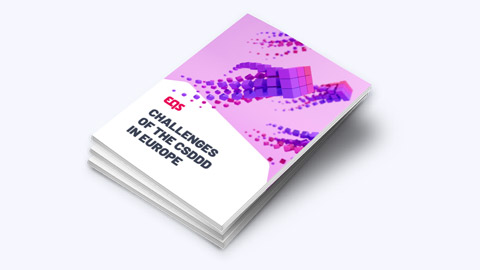Human Rights Officers: Why Companies Need Them
Human Rights Officers are in demand. This is everything you need to know about the role's responsibilities and educational requirements.

Now that companies are starting to be held accountable for human rights violations & environmental risks in their own operations as well as their supply chains, a growing number of workplaces are introducing a new position to help boost levels of responsibility and oversight. Human Rights Officers are experiencing demand from government agencies, NGOs and businesses alike to monitor, document and resolve human rights infringements. While large corporations have long remained reluctant to hire Human Rights Officers due to a lack of awareness about what exactly the role entails, new human rights due diligence measures are now making the position indispensable for many companies.
What is a Human Rights Officer?
The growing need for Human Rights Officers stems from legal developments spurred by years of corporate exploitation. Some companies have committed serious human rights violations for decades from forced labour and criminal exploitation to human trafficking and catastrophic industrial accidents.
The United Nations Global Compact adopted a set of basic principles for corporate responsibility in 1999 as a statement of improvement. The non-binding pact aimed to spur businesses to adopt sustainable and socially responsible policies, as well as to report on their implementation. As part of the process, commitments are solicited to specific goals from CEOs and high-level executives while the organisation acts as a functional responsibility framework that also offers peer networks and training.
More specifically, the issue of human rights was addressed in the United Nations Guiding Principles on Business and Human Rights which were adopted in 2011 – essentially recommendations depending on voluntary application by both governments and companies. While many governments have relied on voluntary action or weak legal frameworks to stomp out corporate exploitation and human rights abuses, some are now pressing on with stricter binding legislation. This is particularly evident in supply chains where human rights violations exist at all levels from collecting raw materials all the way up to the manufacturing process. The United Kingdom, France and Germany are among the countries putting forward supply chain due diligence legislation while the European Union is also introducing a new and far-reaching law.
These laws and similar legislation aimed at curbing human rights violations have made the appointment of a Human Rights Officer a prerequisite for many companies Germany’s Lieferkettensorgfaltspflichtengesetz or Corporate Due Diligence Obligations in Supply Chains actually requires companies to assign the task of human rights oversight to someone within the organisation. He or she is should be responsible for handling violations while a complaints procedure has to be established allowing individuals aware of wrongdoing to report it.
The Human Rights Officer’s responsibilities
Essentially, the role of a Human Rights Officer involves the implementation of effective human rights due diligence whereby a business’s impact on human rights and the environment is carefully monitored. While precise responsibilities may vary between organisations and locations, Human Rights Officers are generally tasked with identifying, investigating and resolving human rights infringements. They can also be tasked to draft a company’s human rights policy or compile situation reports. Some of the Human Rights Officer’s core responsibilities can include :
- Reviewing, monitoring and evaluating operational processes, procedures and practices to ensure the company complies with all legal and ethical human rights standards.
- Acting as the first point of contact for the organisation’s overall human rights strategy.
- Monitoring and researching human rights trends and cases.
- Internal coordination as well as acting as an interface between management and the operational side of human rights due diligence.
- External communication to major stakeholders and the public on the company’s progress and efforts at preventing human rights violations.
- Maintaining relevant documentation, reporting and regulatory oversight as stipulated by local due diligence legislation
- Establishment of grievance mechanisms such as a whistleblowing system whereby the company can be alerted in the case of human rights violations.
- Training and educating staff so that they are aware of expectations or legal changes to compliance guidelines.
Human Rights Officers must be experts in their field and bring a deep knowledge and understanding of the major issues at hand. Companies are advised to locate the position directly under the board of directors where it can operate most effectively. The Human Rights Officer will then act as a link between management and the greatest risk areas, ensuring potential danger is flagged at an early stage.
Workload and the impact of technology
Depending on the company and the scale of its operations, the workload for a Human Rights Officer can sometimes prove to be overwhelming. When this is the case, an organisation can build a human rights team to help distribute the burden or identify contact persons in different departments to assist the Human rights officer. Technology can also prove to be a huge asset and modern digital solutions have revolutionised compliance workflows in recent years.
Modern integrated software packages are now bundling multiple compliance tools such as web-based whistleblowing systems, digital policy managers and interactive rulebooks. This allows Human Rights Officers and teams to work closely with the relevant departments to prioritise and tackle the areas presenting the greatest levels of risk.
For example, opening the whistleblowing system to third party suppliers helps identify potential human rights violations throughout the entire supply chain. An interactive rulebook allows employees to stay aware of policies on the go while also being alerted to any changes instantaneously through push notifications. If a violation does occur, the digital audit trail greatly facilitates investigations.
How to become a Human Rights Officer
To become a Human Rights Officer, a candidate is normally required to have relevant experience and a relevant academic background. This could include a wide range of subjects including political science, social science, law, public administration, international relations, ethics or sociology. It is important to mention that the educational requirements of the position vary depending on an organisation’s size, type and levels of responsibility.
Building knowledge through internships can also help open opportunities. Prioritising internships in areas such as policy, or advocacy can be especially helpful in honing skills and building confidence. Potential candidates are also expected to possess strong interpersonal skills, especially in the realm of communication. Proficiency in a foreign language is also a valuable asset for potential Human Rights Officers.
How much does a Human Rights Officer earn?
Human Rights Officer salaries tend to vary by level and experience as well as multiple factors influencing the employer. According to Glassdoor, the average annual salary for a Human Rights Officer across multiple countries amounted to the following, as of March 2023:
- United Kingdom £37,066 (GBP)
- Canada $61,321 (CAN)
- United States $66,279 (USD)
Gaining an advanced degree such as a PhD, changing employers or being promoted to a managerial position can boost salaries.
Conclusion
In the past, the Human Rights Officer role was not considered important by companies but growing stakeholder expectations and the emergence of multiple due diligence laws have changed things. Its relevance has been highlighted by Germany’s decision to make someone responsible for human rights oversight at companies impacted by its pending supply chain legislation. While the other laws in the pipeline across the world may not go quite as far, organisations should still be proactive on human rights and appoint the experts required to hold their operations to the highest possible standards.

How to effectively create, implement and communicate compliance policies and measure the success of your policy program – for everyone who is responsible for Compliance policies in their organization





